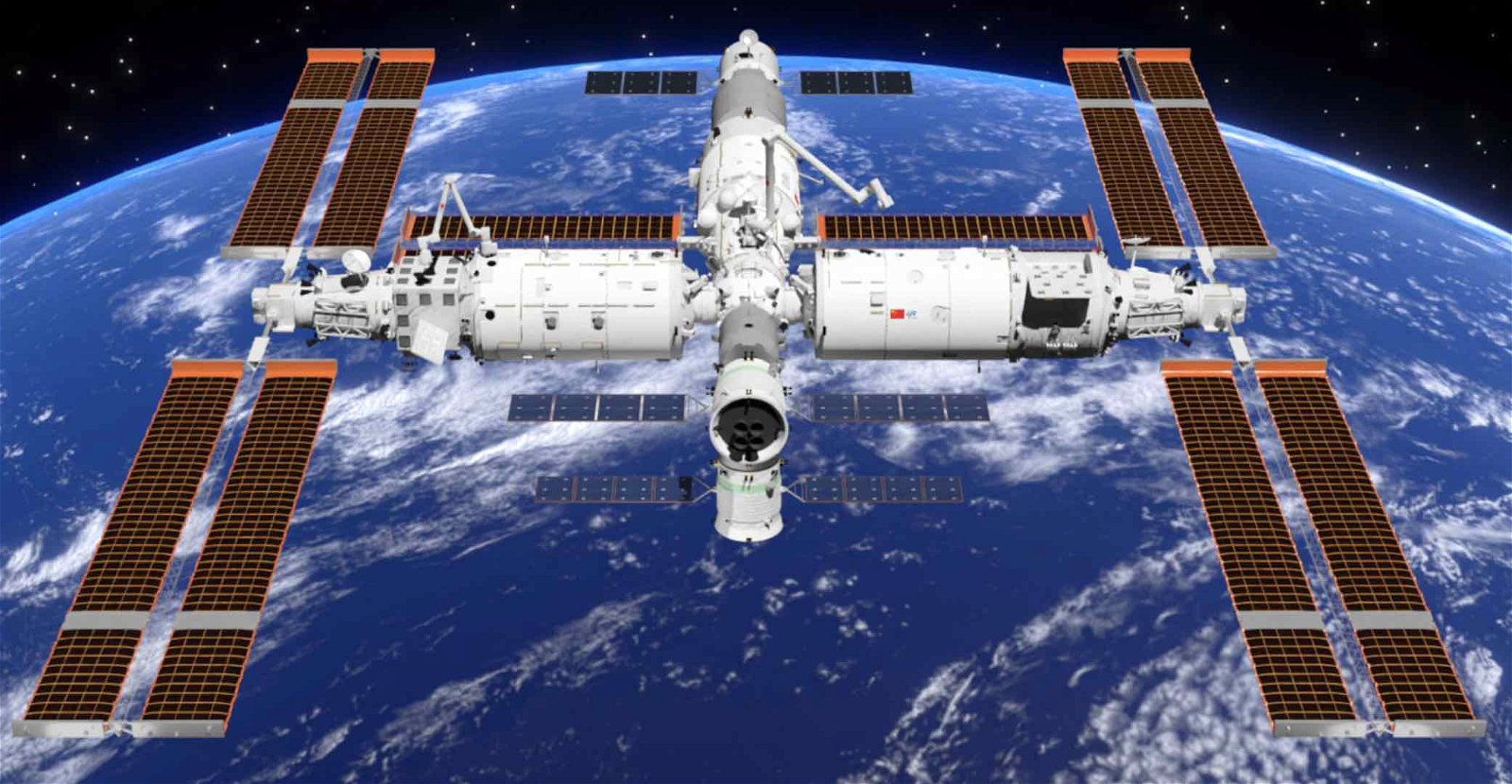

Welcome to this week’s installment of The Intelligence Brief… in recent days, leaked classified documents and testimony from top officials conveyed renewed concerns by U.S. leadership about the space activities of foreign adversaries. In our analysis, we’ll be looking at 1) what the latest top-secret information leaks convey about China and Russia’s space programs, 2) how space stations, communications jamming, and other technologies fit into the current U.S. assessments, and 3) why threats from space aren’t the only things that are currently worrying U.S. officials.
Sign up here to have The Intelligence Brief newsletter sent to your inbox each week.
Quote of the Week
“Now is not the time to allow for any measure of complacency… We are now at the precipice of a new era in space.”
– Gen. Chance Saltzman, Chief of Space Operations
Latest Stories: A few of the stories we’re covering this week at The Debrief include a quick tutorial on how to land a rocket on another planet, moon, or even a comet without completely destroying the landing site or damaging the craft. Elsehere, NASA says this unusual green light seen flashing through the sky over Japan came from space, but it was no meteor, and reporter Tim McMillan also gives us the most comprehensive breakdown yet of the recent Senate hearing on UAP. You can find links to all our recent stories at the end of this week’s newsletter.
Podcasts: This week in podcasts from The Debrief, MJ Banias and Stephanie Gerk talk about UFOs, the government, and decide to take minimum wage jobs at the Pentagon’s AARO UFO office on the latest installment of The Debrief Weekly Report. Meanwhile, this week on The Micah Hanks Program, we are joined by Garry Nolan, a Stanford University professor of pathology who discusses his groundbreaking research into anomalous health incidents and their possible relationship to UAP, as well as the analysis of materials purportedly recovered from anomalous aerial vehicles. You can subscribe to all of The Debrief’s podcasts, including audio editions of Rebelliously Curious, by heading over to our Podcasts Page.
Video News: This Friday, The Debrief will be launching “Ask Dr. Chance,” a brand new 10-part interactive series featuring Dr. Chance Glenn, where he answers your questions about science, space travel and much more. Be sure to check out the first episode tomorrow at noon Eastern. Also, this week on Rebelliously Curious, Chrissy Newton sat down with CFO, professor, Bitcoin enthusiast, and psychedelics advocate Paul Hynek, the son of former scientific advisor to the U.S. Air Force’s UFO investigations J. Allen Hynek. You can also watch past episodes and other great content from The Debrief on our official YouTube Channel.
With all of that behind us, we now shift our attention over to the recent concerns aired by U.S. officials in classified documents and Congressional testimony about foreign adversaries and the emerging threats that their capabilities could pose.
Threats From Space: Documents Highlight Efforts of U.S. Foreign Adversaries
Renewed concerns over potential threats that could arise from the space operations of U.S. adversaries have come to light in recent days following the latest in an ongoing series of U.S. classified document leaks.
The documents, part of a trove leaked onto a Discord server by a 21-year-old Massachusetts Air National Guard member, were first reported by The Washington Post yesterday and detail concerns about the current efforts of adversarial nations—China in particular—and their ambitions in space in the coming years.


According to the top-secret documents, U.S. officials expressed concerns that countries like China are developing capabilities that could potentially put spaceborne operations and other orbital assets of the U.S. and its allies at risk.
Here is what we currently know about the information contained within the document trove, as well as what other officials in recent days have said about foreign threat potentials arising from other domains where conflict may arise.
Space Stations, Communications Jamming, and Threats from Space
According to the documents reviewed by the Post, the use of satellite technologies capable of jamming the communications systems of its enemies had been among the many concerns raised in the recently leaked documents.
Worries that China may attempt to use such technologies in the event of a conflict with Taiwan were emphasized, outlining capabilities that would enable China to disable or destroy ballistic missile early warning satellites.
China’s construction of its own space station was also discussed in the documents. Back in April 2021, China launched the space station’s first module, Tianhe-1, with projections that the remainder would be completed in 2022. In addition to its construction of an independent orbital space platform, the U.S. expressed concerns about China’s aims to capture and exploit territory on the lunar surface rich in native resources where it may construct lunar bases.
The question of whether a territorial dispute with China may occur on the moon is nothing new. Last July, NASA Administrator Bill Nelson told the German newspaper Bild that “We must be very concerned that China is landing on the Moon and saying: ‘It’s ours now and you stay out.’” China subsequently played down Nelson’s concerns, denouncing them as lies.
China’s space program isn’t the only one that concerns U.S. officials, however. The documents also convey the concerns U.S. officials have about Russia’s space activities, although compared with China’s ambitious space program, Russia’s “very likely will diminish during the next decade,” one of the documents said, resulting from a variety of factors that include U.S. sanctions against the country since its invasion of Ukraine.
However, that isn’t to say that Russia hasn’t been ramping up its efforts in other areas, which could point to additional long-term concerns for U.S. officials.
Undersea Operations by U.S. Foreign Adversaries Highest in Years, Top General Says
On Wednesday, April 26, 2023, U.S. Army Gen. Christopher G. Cavoli, Commander of the U.S. European Command, testified before the Senate Armed Services Committee on the current U.S. military posture and national security challenges in Europe. During the session, Cavoli said that Russia’s submarine presence in the Atlantic has increased to levels not seen in recent years.
“The Russians have been more active than we’ve seen them in years,” Cavoli said, noting the country’s “patrols into the Atlantic and throughout the Atlantic are at a high level most of the time, at a higher level than we’ve seen in years.”


Cavoli added that the country’s submarine activity appeared to have risen despite Russia’s ongoing involvement in Ukraine. Last week, a series of drills conducted by the Kremlin’s Pacific Fleet was believed to signal the increased cooperation between Russia and its partnership with China’s military.
Mirroring concerns expressed by Cavoli, Assistant Secretary of Defense for International Security Affairs Celeste Wallander, who appeared alongside Cavoli in yesterday’s hearing, also warned about underestimating Russia’s military capabilities, whether at sea or in other domains.
Wallander, although noting Russia’s ground forces have been significantly reduced during the Ukraine conflict, added that the country “still retains strategic capabilities” that include its submarine forces, what remains the world’s largest nuclear force, and its cyber and other capabilities.
“We should not make the mistake of underestimating Russia’s military capabilities,” Wallander said during yesterday’s hearing.
“The stakes of getting it wrong are too high,” she added.
That concludes this week’s installment of The Intelligence Brief. You can read past editions of The Intelligence Brief at our website, or if you found this installment online, don’t forget to subscribe and get future email editions from us here. Also, if you have a tip or other information you’d like to send along directly to me, you can email me at micah [@] thedebrief [dot] org, or Tweet at me @MicahHanks.


Here are the top stories we’re covering right now…
- Here Are the Major Takeaways You Missed From the Recent Senate Hearing on Unidentified Aerial Phenomena
Here are the key takeaways you likely missed from the recent Senate hearings on AARO and unidentified aerial phenomena.
- Odd Green Light Filmed Over Japan Came from Space, but NASA Satellite Data Reveals It Was No Meteor
Whatever flashed through the skies over Japan certainly wasn’t a bird or a plane… could it have been a meteor? As it turns out, NASA satellite data had the answer.
- How to Land a Rocket on Another Planet Without Wreaking Havoc
How to land a rocket on another planet, moon, or even a comet without completely destroying the landing site or damaging the craft.
- Garry Nolan: UAP Analysis and Anomalous Pathology
This week on The Micah Hanks Program, we are joined by Garry Nolan, a Stanford University professor of pathology who discusses his groundbreaking research into anomalous health incidents
- Paul Hynek: Our Fascination with J. Allen Hynek
Chrissy Newton is joined by guest Paul Hynek for a discussion about his late father, J. Allen Hynek, the renowned astronomer, professor, and ufologist who served as a scientific advisor to the U.S. Air Force on three projects related to UFO studies from the 1940s to the 1960s.
- Mysterious Tracks Spotted in Landsat 9 Satellite Images Over Greenland Prompt NASA Investigation
The Landsat 9 Earth observation satellite captured imagery of a series of mysterious tracks as it passed over Greenland on March 13, 2023. Here’s what a NASA investigation determined.
- Is AI Alignment Research Akin to “Helicopter Parenting”?
AI alignment research aims to steer AI toward the intended goals or ethical principles of humans. But at what point are we over-parenting?
- NASA’s Incredible Superalloy GRX-810 May Lead to New Breakthroughs in Spacecraft Construction
A new 3D printable superalloy capable of producing components for aircraft and spacecraft with unprecedented durability could represent a major breakthrough for the aerospace industry, according to a new NASA study.
- Extreme Weather Warnings and More: The U.K. Just Tested Its Controversial New Emergency Alert System
The U.K. is implementing its new emergency alert system, partially in response to the rapid rise of extreme weather events globally.
- Intelligence Community Leaders Meet at Wright Patterson for “Historic” National Security Briefing
Leaders from the U.S. intelligence community met in Ohio on Friday for an unprecedented national security briefing at Wright Patterson AFB.
- Strange Metals in a Strange Land… This week on The Debrief Weekly Report…
SUBSCRIBE TO ‘THE DEBRIEF WEEKLY REPORT’: Apple Podcasts | Spotify Join Stephanie Gerk and MJ Banias this week as they discuss the latest news from The Debrief. On this week’s episode, MJ and Stephanie talk about UFOs, the government, and decide to take minimum wage jobs at the Pentagon’s AARO UFO office. Steph totally understands quantum mechanics now and how to build strange metals for future computers, and MJ gets all hot and bothered by gravitational waves making photon babies during the dawn […]
- Department of Defense Confirms Reentry of Spacecraft That Plunged into the Sahara Desert This Week
The Rhessi satellite that spent the last decade collecting data about the Sun fell from the sky this week, raining debris over the Sahara.
- No Evidence of ET? Controversy Erupted After the Senate UAP Hearing. Here’s What the Critics Missed
In this week’s Intelligence Brief newsletter, we examine the controversies surrounding yesterday’s Senate UAP hearing, and several key takeaways that many critics of AARO overlooked.
- New Free VR Program, Psyrreal, Lets You Experience Psychedelic Trips Without Drugs
Researchers have created a new freely available VR program called Psyrreal that can simulate the subjective effects of psychedelic experiences.
- The Senate Hearings on Unidentified Aerial Phenomena
This week on The Micah Hanks Program, we analyze the recent Senate hearings on UAP, and what they convey about the U.S.’s assessments of these mysteries in our skies.
- Senate Hearing on UAP Reveals New Videos and Common Features, but Says No Proof of ET
Common shapes of UAP and other characteristics, as well as a pair of new videos were presented in Wednesday’s Senate hearing on UAP.
